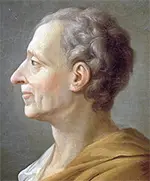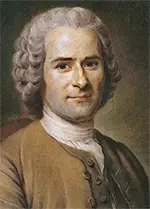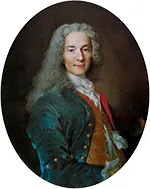The French Revolution
Part 2: Ideas Driving Change The kings of France increased and decreased their reliance on taxation, depending on need. In times of warfare, taxation could be quite high. This was certainly true during the Hundred Years War and was true to a lesser extent during a handful of subsequent wars, notably the wars in the late 17th and early 18th Centuries by Louis XIV. The Sun King famously proclaimed that he was the state and declared personal rule in his later reign. He also oversaw the prosecution of a number of expensive wars, all of which drained the royal treasury even though it was being supplemented with increases in taxation across the board.
Another element in the ultimate rejection of the unfairness that the Ancien Régime had socially and, in many cases, legally maintained came about through the growth of the ideas of the philosophes, Enlightenment thinkers like Jean-Jacques Rousseau and Voltaire. Forming the basis of much of this thought and discussion was the philosophy of René Descartes, whose voluminous and extremely influential work in the first half of the 17th Century included Discourse on Method and Meditations on First Philosophy. First and foremost, Descartes wrote, people must begin with a practice of skepticism, so that true knowledge can be known and true intellectual understanding can be achieved. Later writers like Diderot and Voltaire took this approach to heart, the former in the Encyclopéeid and the latter in the Dictionnaire philosophique. Relying on real world evidence, the philosophes moved Cartesianism out of the realm of speculation and into the practice of empiricism, echoing writings of such English luminaries as Francis Bacon and Isaac Newton. Voltaire, in particular, was a proponent of the philosophy of the Englishman John Locke, particularly Locke's ideas on human rights and, in that regard, governmental responsibility. Voltaire's 1729 work Letters on the English Nation was none too friendly to French government and society, as compared to England's. Perhaps most emblematic of these ideas could be found in The Social Contract, a 1762 work by Rousseau. Among his more well-known arguments was that "Man is born free, yet everywhere he is in fetters." Rousseau enunciated Locke's idea of a contract between the people and their government, and this idea of popular sovereignty eventually infused the conduct of revolutionaries not only in France but also in the United States. 
French writers such as Montesquieu and Voltaire wrote serious tracts; they also wrote satires, the most famous of which is likely Voltaire's Candide. Their intent, for the most part, was to discuss such things, not to advocate any sort of action, particularly not the violent kind. They envisioned, rather, an environment that would foster reasoned discussion about the most fundamental of things, such as the way that a monarch treated his people and the way that members of society treated one another. Criticisms of the Ancien Régime were plentiful, as were questions about the true intent of the monarch. Montesquieu, in particular, was fond of the theory of separation of powers with regard to government and espoused such ideas in his 1748 work De l'Esprit des Lois (The Spirit of the Laws). At the same time, however, the philosophes did not advocate revolution or envision themselves as playing a role in government of any kind, monarchical or more representative. In fact, most of the philosophes were well-to-do intellectuals who had little sympathy for the plight of those below them on the economic scale. Nonetheless, the dispossessed seized on the various ideas put forward by the philosophes, and the fervor for change reached a fever pitch as the 18th Century wound down. |
|
Social Studies for Kids
copyright 2002–2024
David White






